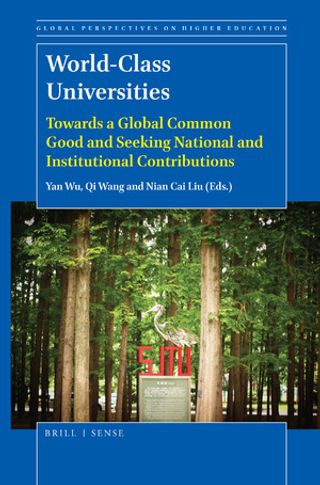?
State and World-Class Universities: Seeking a Balance between International Competitiveness, Local and National Relevance
Ch. 13. P. 243–260.
Фрумин И. Д., Лисюткин М. А.
В книге

Netherlands: Brill, 2018.
Дежина И. Г., Ефимова Г. З., Высшее образование в России 2022 Т. 31 № 3 С. 28–39
Реализация в отечественных университетах Проекта 5-100, направленного на повышение их конкурентоспособности через адаптацию к мировым стандартам и включение в международную образовательную среду, принесла определённые количественные и качественные результаты. При несомненных достижениях вузов – участников Проекта, в принятых механизмах его реализации обнаружились и некоторые проблемные зоны для дальнейшего развития научно-образовательной среды. Такие проблемные зоны в среднесрочной ...
Добавлено: 5 сентября 2022 г.
Трубникова Е. И., Мир России: Социология, этнология 2022 Т. 31 № 1 С. 25–48
Одной из главных целей программ превосходства в области высшего образования является повышение конкурентоспособности национальных университетов на мировом уровне. Однако в зависимости от страны реализации такие инициативы превосходства могут приводить к разным результатам. Исследование представляет анализ скрытых взаимоотношений внутри академических сетей, которые зачастую подменяют собой позитивный академический нетворкинг. Для иллюстрации предлагается использовать теорию обмена дарами. При ...
Добавлено: 25 ноября 2021 г.
Бывальцева-Станкевич А. А., Панова А. А., / NRU Higher School of Economics. Series EDU "Education". 2021. No. 62.
Добавлено: 19 октября 2021 г.
Трубникова Е. И., Мир России: Социология, этнология 2020 Т. 29 № 2 С. 72–91
Существуют принципиально разные позиции относительно оценки результатов и текущего состояния Проекта 5-100. С одной стороны, отдельные участники проекта значительно улучшили свои показатели, и анализ официального ресурса, посвященного Проекту 5-100, даже позволяет сделать оптимистичные выводы об успехе в его реализации. С другой стороны, ни один из университетов не приблизился к желаемой позиции, а именно к вхождению ...
Добавлено: 8 апреля 2020 г.
Егоров А. А., Лешуков О. В., Фрумин И. Д., Tertiary Education and Management 2020 Vol. 26 No. 1 P. 77–90
Добавлено: 9 августа 2019 г.
Antonowicz D., Cantwell B., Фрумин И. Д. и др., , in: High Participation Systems of Higher Education.: Oxford: Oxford University Press, 2018. P. 94–125.
This chapter explores horizontal diversity in higher education in the context of high participation systems (HPS), focusing on differences in institutional mission, form and type, and internal diversity within institutions. The chapter starts with an analysis of scholarly approaches to diversity. The dominance of the market diversity perspective (‘deregulate to create more choices’) indicates not ...
Добавлено: 28 января 2019 г.
Рудаков В. Н., Прахов И. А., / NRU Higher School of Economics. Series WP BRP "Economics/EC". 2019. No. 208/EC/2019.
Добавлено: 22 января 2019 г.
Фрумин И. Д., Лисюткин М. А., , in: International Status Anxiety and Higher Education: The Soviet Legacy in China & Russia.: Hong Cong: Springer, 2018. Ch. 9 P. 237–257.
Добавлено: 29 октября 2018 г.
Шибанова Е. Ю., Платонова Д. П., Лисюткин М. А., Russian Education and Society 2018 Vol. 60 No. 8-9 P. 682–715
Добавлено: 17 октября 2018 г.
Малошонок Н. Г., Терентьев Е. А., Higher Education 2019 Vol. 77 No. 2 P. 195–211
Добавлено: 22 апреля 2018 г.
Стерлигов И. А., Higher Education in Russia and Beyond 2014 No. 1 P. 11–14
Добавлено: 29 января 2015 г.
Салми Д., Фрумин И. Д., Вопросы образования 2013 № 1 С. 25–68
Авторы анализируют реализованные в течение последних 15 лет в разных странах мира инициативы по достижению выдающихся результатов в секторе университетского образования. На основании международного опыта и оценки последних преобразований в системе высшего образования в России они приходят к выводу, что целями проектов по повышению конкурентоспособности российских университетов должны быть: интенсивное развитие многопрофильных центров выдающихся достижений ...
Добавлено: 27 апреля 2013 г.